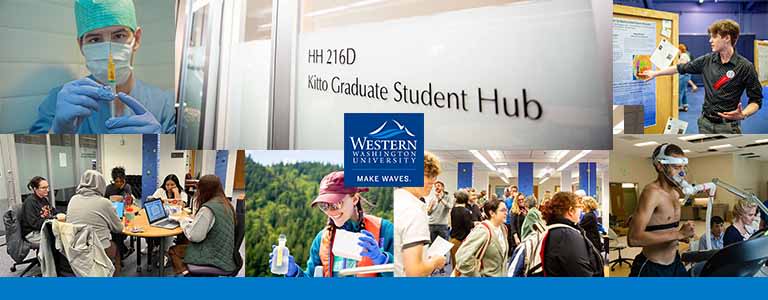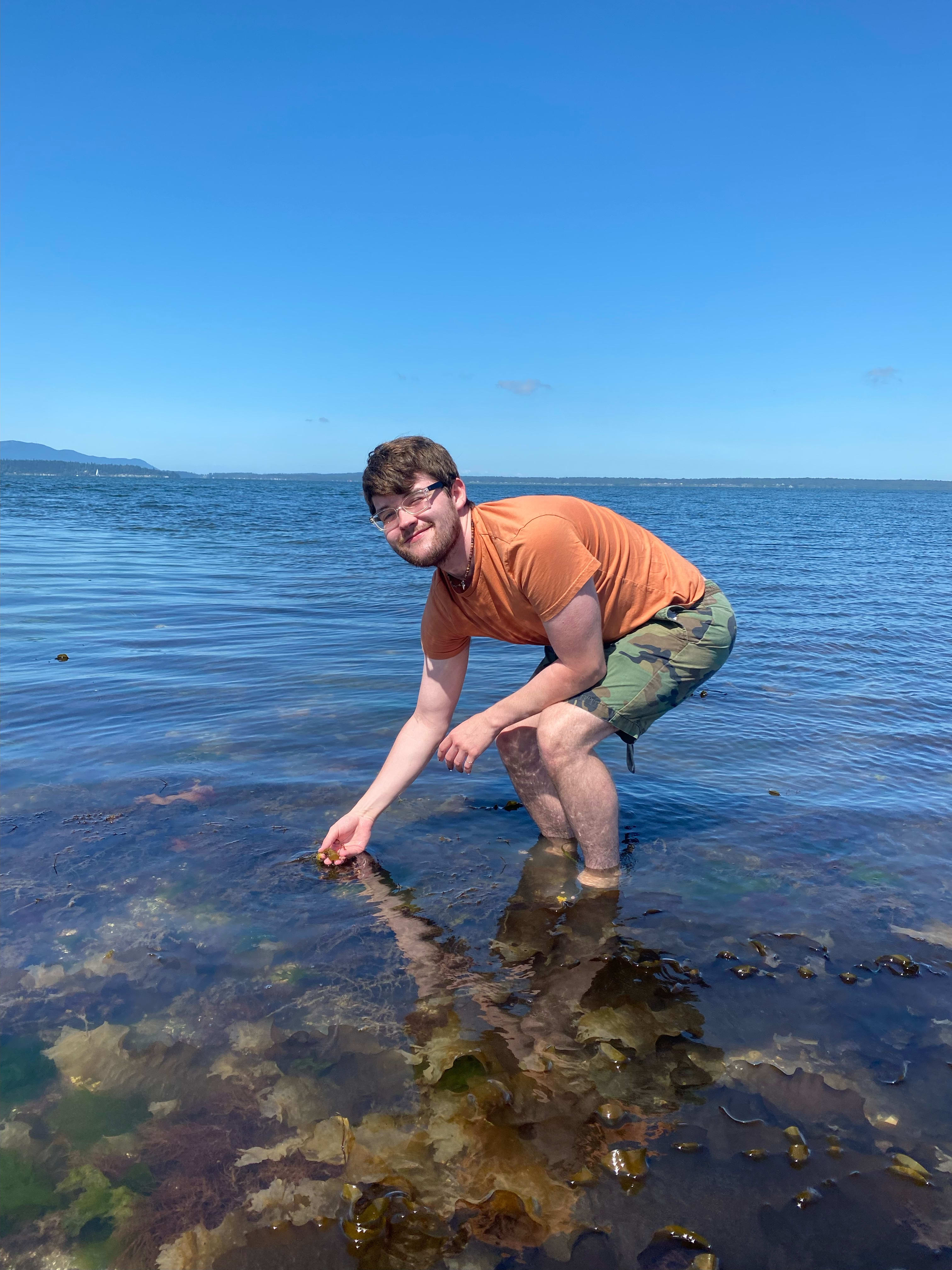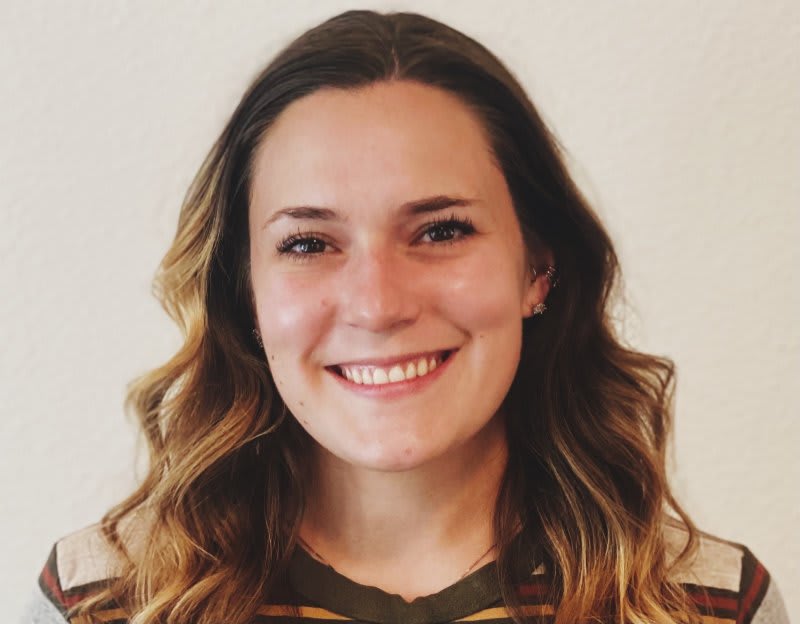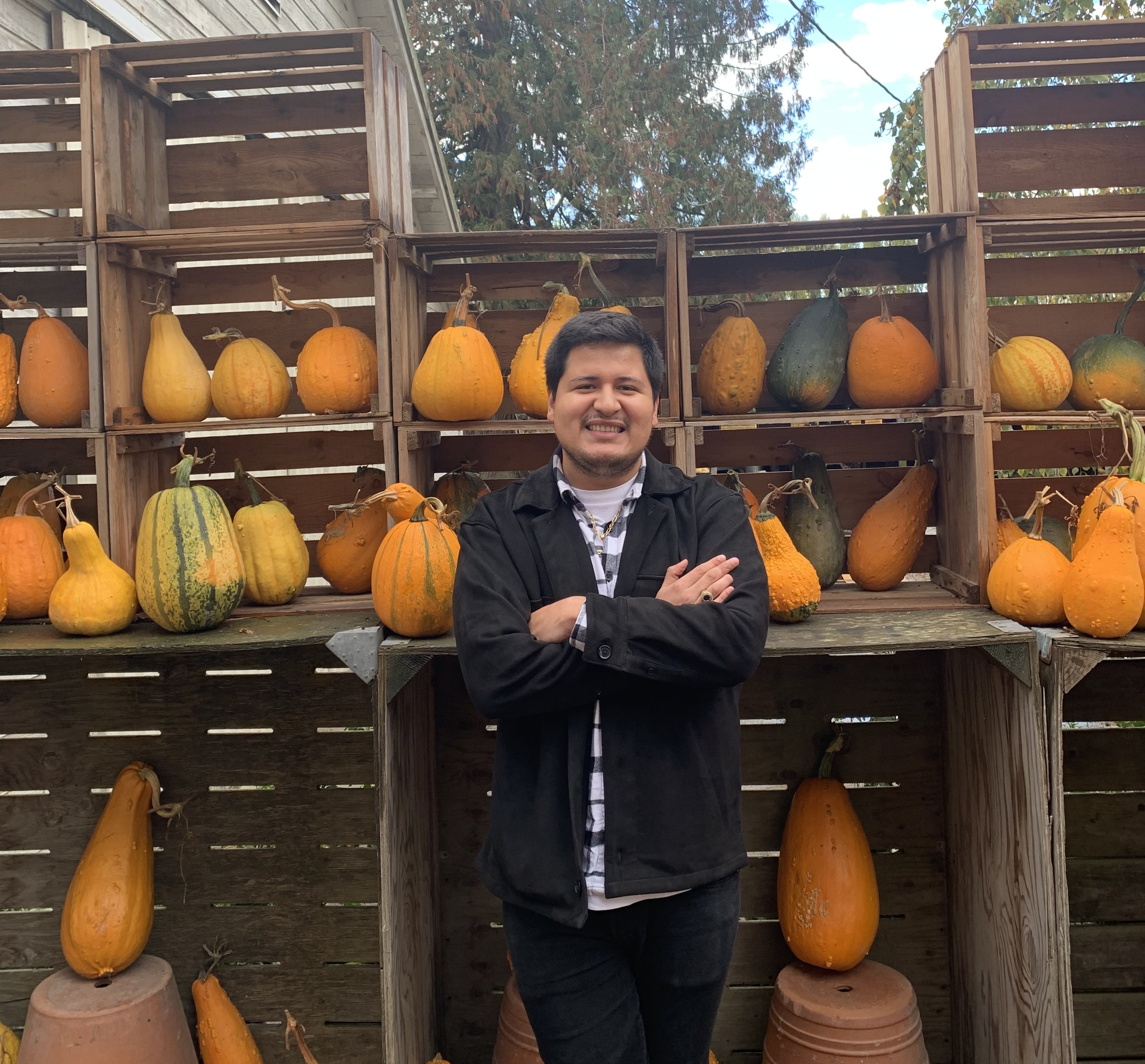
Support Graduate Students on Give Day
After much excitement and anticipation, the Kitto Grad Hub opened last October, thanks to former Dean Kathy Kitto’s generous gift. The Kitto Grad Hub holds the promise of making a significant difference in the lives of graduate students at Western and in their communities. Now that it’s open, we want to keep up the momentum.
To that end, the first $5,000 in donations to the Kitto Grad Hub for Give Day will be generously matched by a close friend of Kathy’s, Diane Norman.
Will you help us reach our $5,000 goal?
Gifts supporting the Kitto Grad Hub expand educational and professional opportunities for grad students in all disciplines and are critical for the future of graduate student professional development and academic success.
Meet the Graduate Students Who Benefit from Your Generosity

Jeremy Johnson (he/him), a graduate of WWU’s Master’s of Science in Biology program, recently received a Graduate Research and Creative Opportunities Grant from WWU for his work on the chemicals produced by Salish Sea benthic diatoms.
As Johnson explains, diatoms are a class of single-celled phytoplankton. He studies live on the seafloor and notes that it’s the “slimy brown stuff you might touch at the beach.” If you peek at them under a microscope, you’ll see all kinds of dynamic structures—star patterns, ovals, chains, and more. And not only do diatoms look like beautiful little glass sculptures, they’re also ecologically important. They account for over 20 percent of the oxygen produced on the planet. In terrestrial comparison, that’s more than all rainforests combined!
As Johnson’s research has demonstrated, these diatoms produce compounds called polyunsaturated aldehydes (PUAs). In a rather sneaky way, the chemicals deter copepods from feasting on the diatoms: the PUAs concentrate in the copepods’ gonads, then in their eggs, ultimately reducing offspring survival rates. In simple terms, diatoms produce PUAs to limit future predators in their community. Crucially, PUAs and their impact on predator-prey populations may ripple through entire ecosystems since diatoms comprise the lowest level of the food chain.
Johnson loves that his research requires so much back and forth between two of his strong suits: biology and chemistry. Throughout his project, he worked closely with advisors Dr. Brady Olson (biology) and Dr. Karin Lemkau (chemistry).
During his time at Western, when Johnson wasn’t in his lab, he was often teaching undergraduate biology labs. “Interacting with my students every week, understanding what they were going through, and helping them work through it [was] very fulfilling,” he says.
What’s next for Johnson? Hopefully, more diatom research: He hopes to continue his work in a PhD program.
Learn more about Western’s master's program in biology at gradschool.wwu.edu/biology.
 Jessi Gauvin, MS Candidate in Experimental Psychology
Jessi Gauvin, MS Candidate in Experimental PsychologyJessi Gauvin (she/her) is a graduate student of experimental psychology at Western who studies Alzheimer’s disease. Gauvin says she’s drawn to this kind of research because of the complexity of neurodegenerative diseases and the need to develop more effective treatment. Last spring, Gauvin received a Research and Creative Opportunities Grant from Western to help fund her research.
As an undergraduate, Gauvin was a criminal justice and political science major at Washington State University. While there, she took a biopsychology class that stuck with her and, over time, ignited her passion for psychology. She went on to graduate with her BA in criminal justice and political science, then decided to shift her focus. Now, after a couple of free online classes that helped narrow her interests, she’s a grad student at WWU conducting exciting research on therapeutic treatments for Alzheimer’s disease.
Gauvin’s research advisor is WWU Professor of Psychology Jacqueline Rose, who runs the Rose lab and specializes in neuroplasticity and behavior. Research in the Rose lab, which is attached to the Behavioral Neuroscience Program within the Psychology Department, uses a type of microscopic worm, C. elegans, as a model organism for studying behavior and learning. The C. elegans model system allows researchers in the lab to investigate how neurons react and modify themselves depending on stimuli changes.
Though most Rose lab research typically focuses on C. elegans and learning, research on Alzheimer’s disease is unique to Gauvin.
“I’m very grateful to Dr. Rose for passing this research on to me,” Gauvin said. Gauvin studies the effect of ferulic acid on Alzheimer’s disease. Ferulic acid is an antioxidant compound commonly found in fruits, vegetables, coffee, and teas. According to Gauvin, new research suggests that antioxidants like ferulic acid might be linked to a delay in the onset of Alzheimer’s disease in some patients. To study this link, Gauvin feeds ferulic acid to an Alzheimer’s model of C. elegans to observe whether the introduction of ferulic acid causes any changes in the behavior or receptor expression in the worms.
Gauvin works in collaboration with undergraduate students like Caitlyn Croppi, who assists with setting up and monitoring the worms. Gauvin’s Research and Creative Opportunities Grant allowed her to purchase essential materials for the PCR testing portion of her research. Currently, Gauvin is finishing up the last stages of qRT-PCR testing and will analyze the results in the coming months.
After she graduates from Western, Gauvin hopes to work in a lab with C. elegans and is particularly interested in conducting more research on gut microbiomes and probiotics.
For more information about experimental psychology at WWU, visit https://gradschool.wwu.edu/experimental-psychology.
 Miguel Gonzalez Ramirez, Master's in Teaching
Miguel Gonzalez Ramirez, Master's in Teaching
In high school, the history classroom was one of the places where Gonzalez Ramirez felt the safest. While in the MIT program, he worked to build safe and supportive environments in the classroom during practicum and as a mentor to undergrads in Woodring’s Office of Diversity, Recruitment, and Retention.
During Gonzalez Ramirez’s first two quarters, he worked with students at Shuksan Middle School in Bellingham. Then he moved to Ferndale High School, collaborating with a teacher in civics, AP government, and world history classes.
Gonzalez Ramirez says he benefited from the guidance of his professors and his advisor, Dr. A Longoria. “[The faculty] want to make sure that what we're learning in class can be applied to our practicums so we’ll feel ready to be out there by ourselves,” Gonzalez Ramirez said.
In addition to his studies, Gonzalez Ramirez served as co-chair of the Latinx Student Union and helped start Latinx Men in Higher Education, a new student group, which seeks to build community, address issues like toxic masculinity, and provide professional development opportunities.
As a teacher, Gonzalez Ramirez’s wants to help Latinx students overcome the cultural barriers that he, the son of Mexican immigrants, has faced. “It took me until I got to Western to have an educator that looked like me, and I’d like to have [my students] see someone in a teacher role that has been through the same things they have.”
Learn more at gradschool.wwu.edu/admissions!
When you support the Kitto Grad Hub, your gift to graduate students matters now and continues to give for generations to come.

